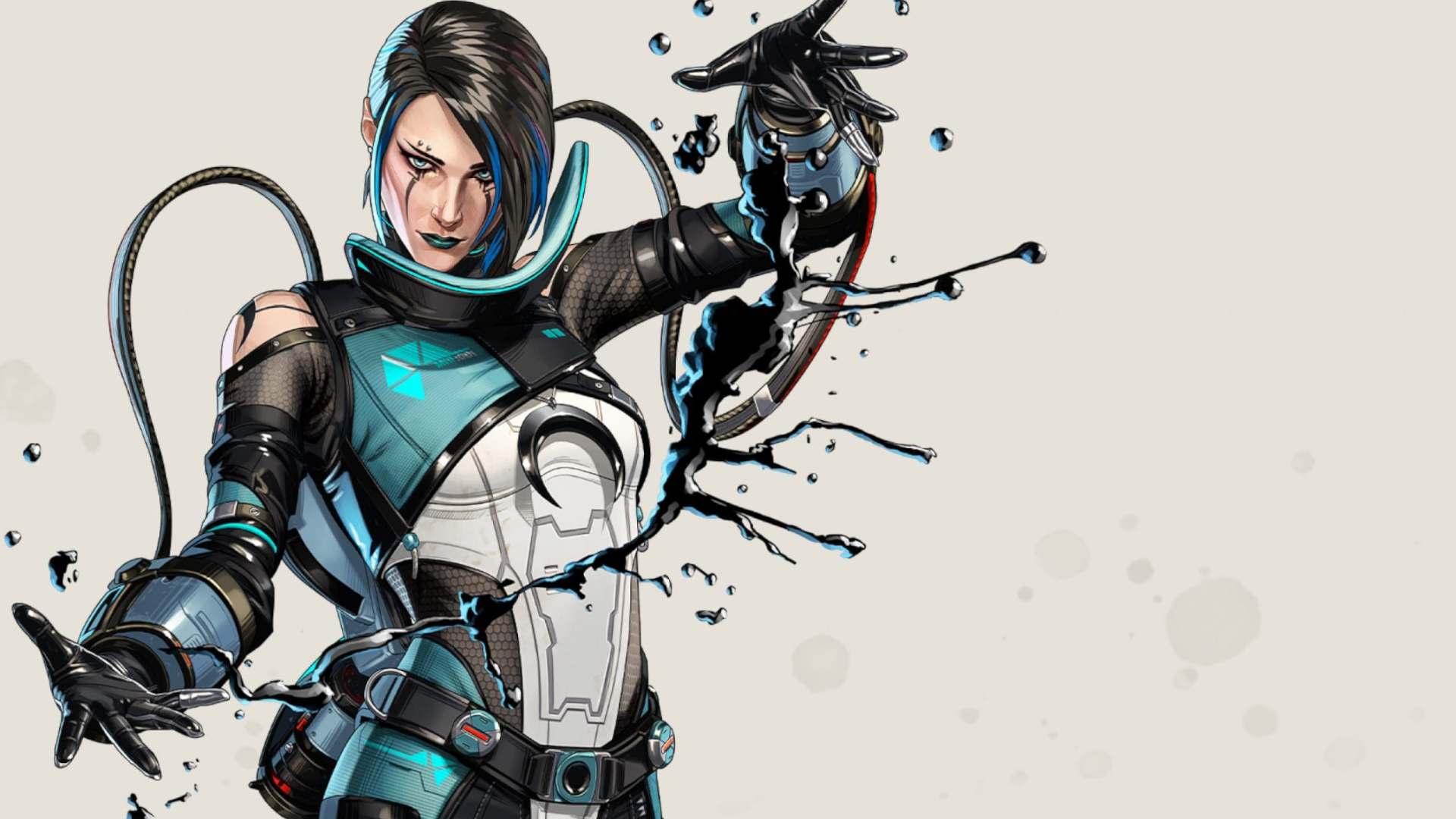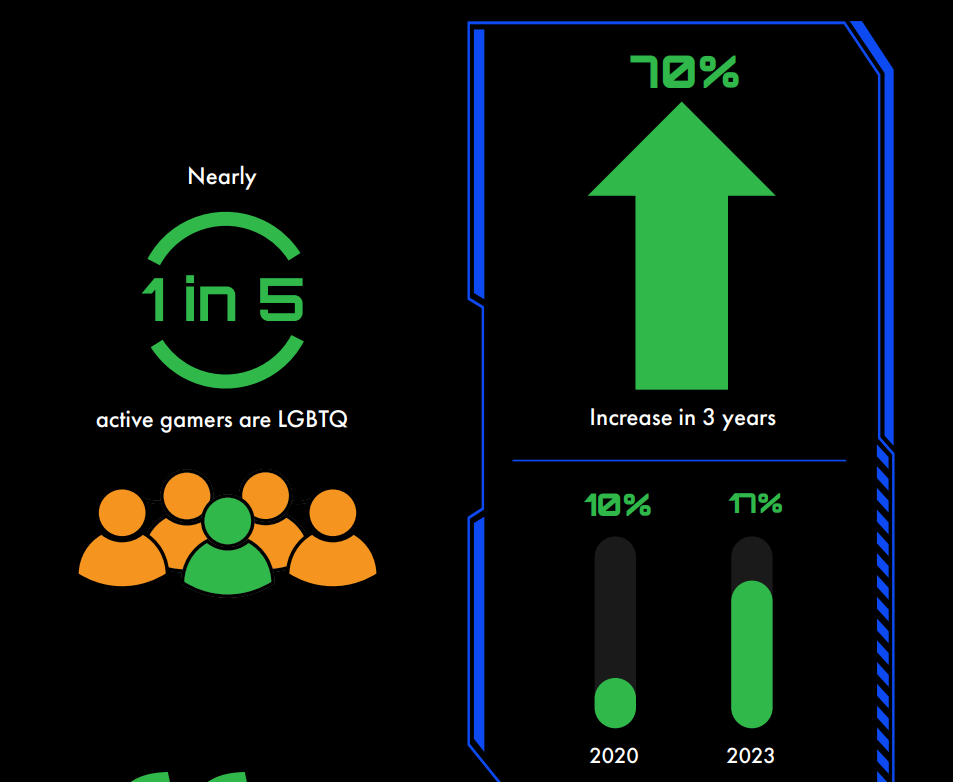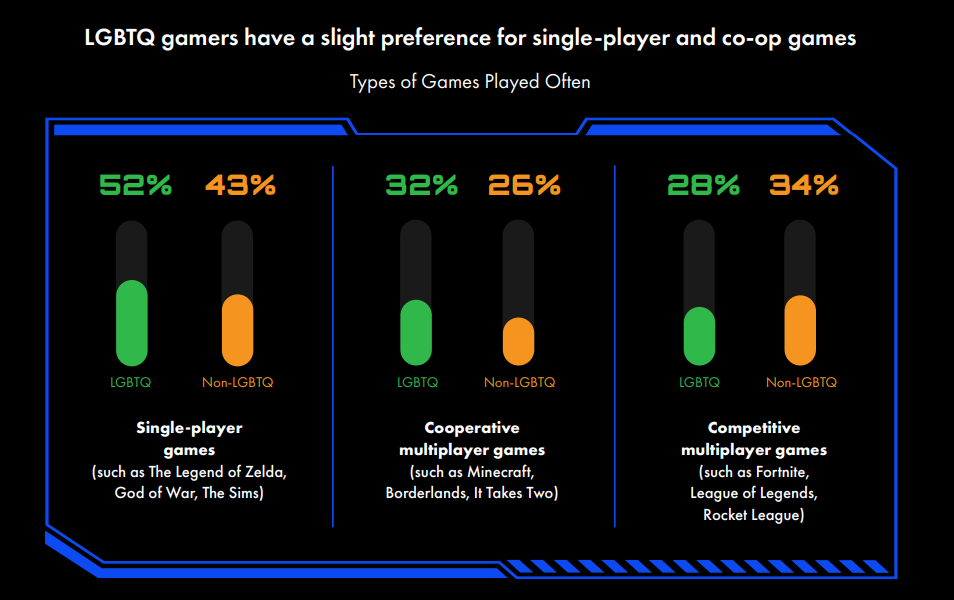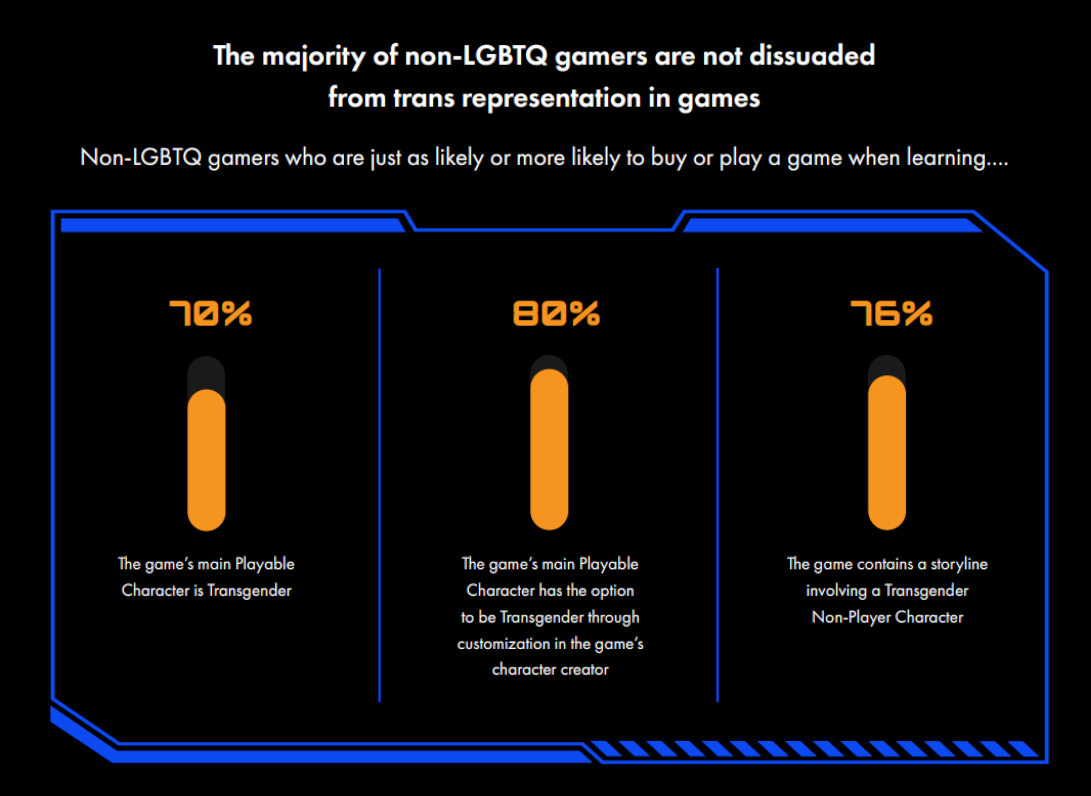The majority of non-LGBTQ+ gamers don't care if a main character is trans, according to GLAAD Gaming's debut report
GLAAD Gaming's 2024 report could dispel the common mythology of LGBTQ+ inclusion in games.

To accompany the official launch of GLAAD Gaming, the organisation has released its first report on the state of LGBTQ+ gamers in the industry—and it could banish some common assumptions made by the public at-large.
Founded in 1985 during the AIDS epidemic, GLAAD targeted defamatory coverage and was able to shift the editorial policy of The New York Times. Since then, it's become one of the largest non-profit LGBTQ+ advocacy organisations in the world, advocating for proper representation across several forms of different media including film, advertising, and social media initiatives.
Its foray into gaming has been more recent. Originating from the GLAAD Media Institute (created in 2018), the organisation has collaborated with several studios, most recently Respawn Entertainment—who worked with GLAAD on the canonically-trans character Catalyst in Apex Legends.
In a full report shared with PC Gamer (and released shortly before publication), GLAAD has continued to further its advocacy in the gaming industry. Developed alongside information, data and market measurement firm Nielsen, its first report has turned up some interesting finds.
LGBTQ+ people are disproportionately gaming (and for longer, too)
While the full report has a lot more in the way of details, one in particular drew my eye. According to GLAAD, 17%—nearly 1 in 5—of gamers are LGBTQ+, which is a 7% increase from a previous Nielsen report in 2020. The report makes note of a Gallup Survey which estimated that around 7.2% of US adults "identified as LGBT".

Taking that data at face-value, LGBTQ+ people are disproportionately gaming—1 in 10 compared to 1 in 5. However, GLAAD's survey sample features gamers between the ages of 13 and 55, while Gallup's survey targets US adults over the age of 18. In the same Gallup survey, it found that a far larger 19.7% of adults between ages 18 and 25 "identified as LGBT".
However: While comparisons against the US population could be explained by a different sample age, the 2020 Nielsen report—the basis for that 7% stated increase—also surveyed "people over the age of 13", so there's less variance there. As a personal point of pride, we're also apparently more hardcore. GLAAD's survey states: "Counter to stereotypes, LGBTQ gamers make up 19% of heavy/core gamers (defined as playing 10+ hours per week on PCs or consoles)."
Keep up to date with the most important stories and the best deals, as picked by the PC Gamer team.
LGBTQ+ gamers showed a preference for single-player or co-op games as opposed to competitive multiplayer games such as League of Legends or Fortnite. In single player games, 52% of respondents were LGBTQ+ while 43% weren't, while competitive multiplayer games skewed towards non-LGBTQ+ players (28% were, 34% weren't).

While it's important not to jump to conclusions regarding raw data, it's hard not to see a pattern between this and the survey's reports of harassment in online games. 52% of LGBTQ+ players said they'd been harassed while playing online, compared to 38% of non-LGBTQ+ players. They're also less likely to feel comfortable using voice chat, and less likely to feel as if the gaming community is welcome to them.
That's despite the fact that LGBTQ+ players also felt like games were a key escape from their real-life circumstances: "35% of LGBTQ gamers feel that gaming is their only outlet for socialising with other people, compared to 28% of non-LGBTQ gamers … half (50%) of LGBTQ gamers say that they feel more accepted by the gaming community than they do where they live, and that goes up to 55% for those residents of states that have proposed or passed anti-LGBTQ legislation."
Most non-LGBT gamers don't mind trans characters
The survey also contradicts certain narratives we see in online spaces. It's easy to see someone yelling about pronouns in Starfield and believe that LGBTQ+ inclusion is a hot-button issue, no matter how innocuous that inclusion actually is. GLAAD's study, though, found that just 30% of non-LGBTQ+ players would be less likely to buy a game with a transgender main character in it. That was reduced by 10% in games with a customisable character where transgender representation is an option—think Baldur's Gate 3 or Cyberpunk 2077. The majority of people genuinely don't care.

I've spoken pretty highly of the study so far—and I still think it's a fascinating landmark. However, there are some later points that I'm not so sure about. For example, GLAAD's study cites that it identified "games on the major PC and console distribution platforms that are publicly tagged or listed as having LGBTQ content" to establish "a baseline against which future industry efforts can be measured."
The study states: "These games account for less than 2% of Xbox, PlayStation, and Nintendo’s total digital libraries. For Steam, it is less than 2.5%, but drops to just 1.7% when adult-only games are excluded." However—at least from my personal observations—games on Steam are typically only tagged as being "LGBTQ+" when queerness forms an important part of the narrative.
While I don't think the comparison is unfair—and queer rep in games certainly has room to improve—I do think the report neglects to mention how vital being able to inhabit a custom LGBTQ+ character is for a lot of queer players.
Baldur's Gate 3, for example, allows you to have a gay romance with any one of its characters, select non-binary pronouns, and play as a trans character (both pronouns and genitalia are not locked to your character's body type). Unless I've misunderstood, under GLAAD's definition Baldur's Gate 3 isn't a game that "has LGBTQ content"—which doesn't strike me as entirely fair.
While there is a discussion to be had there about whether a 'playersexual' companion still counts as representation, Astarion is attracted to the same gender as a baseline, having dated, slept with, and potentially even loved men explicitly in his backstory.
Regardless of my own personal nitpicks, the survey itself marks not only a great step forward but a useful resource to help us contextualise what's actually going on in the industry—I'd rather wrestle with data rather than controversies and tired talking points, and I'm keen to see what conversations come up as a result.

Harvey's history with games started when he first begged his parents for a World of Warcraft subscription aged 12, though he's since been cursed with Final Fantasy 14-brain and a huge crush on G'raha Tia. He made his start as a freelancer, writing for websites like Techradar, The Escapist, Dicebreaker, The Gamer, Into the Spine—and of course, PC Gamer. He'll sink his teeth into anything that looks interesting, though he has a soft spot for RPGs, soulslikes, roguelikes, deckbuilders, MMOs, and weird indie titles. He also plays a shelf load of TTRPGs in his offline time. Don't ask him what his favourite system is, he has too many.

